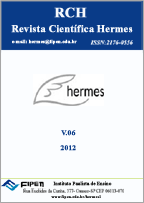Distance Learning in higher Education in Brazil: an over view
DOI:
https://doi.org/10.21710/rch.v6i0.52Keywords:
higher education, e-learning, teaching-learning processAbstract
The constant technological advances have changed the ways people relate, communicate, playand learn. In this scenario, Distance Education - educational modality in Brazil for over acentury - has gained strength and has recreated its features and its ways to make distanceeducation in this country, bringing great promises for the democratization of education.Distance Education courses have outnumbered the Presence modality in higher education,Revista CientÃfica Hermes 6: 6-15, 2012however not all educational institutions that have chosen to offer distance learning courses viathe Internet are fully committed to the quality of education provided. Based on this fact anddue to expansion of the type of education, the Ministry of Education and Culture (MEC)considered it essential to define the principles, guidelines and criteria that are benchmarks ofquality for institutions offering distance education courses in higher education. From thesedidactic and pedagogical guidelines higher education institutions must create theirPedagogical Political Projects in order to offer distance college courses.References
Castells, M. 1999. A Sociedade em Rede. Paz e Terra, São Paulo.
Censo ead br. 2012. Relatório analítico da aprendizagem a distância no Brasil 2010. Pearson Education do Brasil, São Paulo.
Clementino, A. 2002. Professores em movimento: Desafios da sociedade da informação para a prática docente. Dissertação de mestrado. Universidade Metodista de São Paulo, São Bernardo do Campo.
Clementino, A. 2008. Didática Intercomunicativa em Cursos Online Colaborativos. Tese de doutorado. Faculdade de Educação, Universidade de São Paulo, São Paulo.
Kenski, V.M. 2003. Tecnologias e ensino presencial e a distância. Papirus, Campinas.
Lévy, P. 1999. Cibercultura. Editora 34, Rio de Janeiro.
Litwin, E. 2001. Educação a Distância: Temas para o debate de uma nova agenda educativa. Artmed, Porto Alegre.
Nunes, I.B. 2009. A história da EAD no mundo. In: Litto, F.M. & Formiga, M. (orgs.). Educação a Distância: o estado da arte. Pearson Education do Brasil, São Paulo.
MEC – Ministério da Educação. 2007. Referenciais de qualidade para educação superior a distância: versão preliminar. Disponível em<http://portal.mec.gov.br/seed/arquivos/pdf/referenciaisead.pdf>. Acesso em: jun/2011.
Moore, M.G. & Kearsley, G. 2007. Educação a Distância: Uma visão integrada. Thomson Learning, São Paulo.
Moran, M.J. 2002. O que é educação a distância? Disponível em <http://www.eca.usp.br/prof/moran/dist.htm>. Acesso em: jun/2011.
Valente, J.A. 2003. Educação a distância no ensino superior: soluções e flexibilizações. Revista Interface - Comunicação, Saúde, Educação 7(12): 12-18.
Vianney, J. 2003. A universidade virtual no Brasil. 2003. Informe apresentado no Seminário Internacional sobre Universidades Virtuais na América Latina e Caribe. Quito – Equador.
Downloads
Published
How to Cite
Issue
Section
License
Copyright (c) 2012 Revista CientÃfica Hermes - FIPEN

This work is licensed under a Creative Commons Attribution 4.0 International License.






